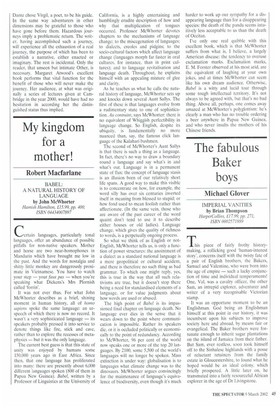My kingdom for a mother!
Robert Macfarlane
BABEL: A NATURAL HISTORY OF LANGUAGE by John McWhorter Hamish Hamilton, £15.99, pp. 400, ISBN 04434007897 Certain languages, particularly tonal languages, offer an abundance of possible pitfalls for non-native speakers. Mother and horse are two near-homophones in Mandarin which have brought me low in the past. And the words for nostalgia and shitty little monkey are dangerously proximate in Vietnamese. You have to watch your step — your faux pas — when you're speaking what Dickens's Mrs Plornish called forrin'.
It was not ever thus. For what John McWhorter describes as a brief, shining moment in human history, all of homo sapiens spoke the same language: an urspeech of which there is now no record. It wasn't a very sophisticated language — its speakers probably pressed it into service to denote things like fire, stick and cave, rather than to explore the recesses of metaphysics — but it was the only language.
The current best guess is that this state of unity was enjoyed by humans some 150,000 years ago in East Africa. Since then, that one language has proliferated into many: there are presently about 6,000 different languages spoken (800 of them in Papua New Guinea). Babel, written by a Professor of Linguistics at the University of California, is a highly entertaining and humblingly erudite description of how and why that multiplication of tongues occurred. Professor McWhorter devotes chapters to the mechanisms of language change; to the miscegenation of languages; to dialects, creoles and pidgins; to the socio-cultural factors which affect language change (languages morph far faster in oral cultures, for instance, than in print cultures): and to language revitalisation and language death, Throughout, he explains himself with an appealing mixture of glee and clarity.
As he teaches us what he calls the natural history of language, McWhorter sets up and knocks down several Aunt Sallys. The first of these is that languages evolve from a rudimentary state to one of sophistication. Au contraire, says McWhorter: there is no equivalent of Whiggish perfectibility in language change. So English, despite its ubiquity, is fundamentally no more nuanced than, say, the famous click language of the Kalahari bushmen.
The second of McWhorter's Aunt Sallys is that there is such a thing as a language. In fact, there's no way to draw a boundary round a language and say what's in and what's out. Language is in a permanent state of flux: the concept of language stasis is an illusion born of our relatively short life spans. A good way to make this visible is to concentrate on how, for example, the word silly has over six centuries inverted itself in meaning from blessed to stupid; or how fond used to mean foolish rather than affectionate. (In the same vein, those who are aware of the past career of the word quaint don't tend to use it to describe either houses or old ladies). Language change, which gives the quality of richness to words, is a perpetually ongoing process.
So what we think of as English or notEnglish, McWhorter tells us, is only a function of power structures: the anointment of a dialect as a standard national language is a mere geopolitical or cultural accident, and there is therefore no such thing as had grammar. To which one might reply, yes, this is true in the way that all such relativisms are true, but it doesn't stop there being a need for standardised elements of a language, or for value judgments about how words are used or abused.
The high point of Babel is its impassioned final chapter on language death. No language ever dies in the sense that it wears down to the point where communication is impossible. Rather its speakers die, or it is occluded politically or economically to the point of redundancy. According to McWhorter, 96 per cent of the world now speaks one or more of the top 20 languages. By 2100, some 5,500 of the world's languages will no longer be spoken. Mass extinction is under way: globalisation is to languages what climate change was to the dinosaurs. McWhorter argues convincingly for the maintenance of language's equivalence of biodiversity, even though it's much harder to work up our sympathy for a disappearing language than for a disappearing species: the death of the panda seems intuitively less acceptable to us than the death of Occitan.
I've only one real quibble with this excellent book, which is that McWhorter suffers from what is, I believe, a largely American disease: the tendency to overuse exclamation marks. Exclamation marks, E. M. Forster observed at his most arid, are the equivalent of laughing at your own jokes, and at times McWhorter can seem like his own dream audience. Otherwise, Babel is a witty and lucid tour through some tough intellectual territory. It's not always to be agreed with, but that's no bad thing. Above all, perhaps, one comes away amazed at McWhorter's polyglottism: he's clearly a man who has no trouble ordering a beer anywhere in Papua New Guinea, and who never insults the mothers of his Chinese friends.














































































 Previous page
Previous page